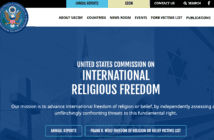SOURCE: Jehovas Witnesses website, JANUARY 23, 2015: Russian Federation Supreme Court Decision Sets Dangerous Precedent for Jehovah’s Witnesses in Russia
On November 12, 2014, the Supreme Court of the Russian Federation upheld a lower court ruling that declared the Local Religious Organization (LRO) of Jehovah’s Witnesses in Samara to be extremist. The prosecutor’s office in Samara initiated its case against the Samara LRO in 2014 after law-enforcement officials searched facilities that the Witnesses rent for religious meetings and “found” a handful of their religious publications that have been banned nationwide.
The banned publications had earlier been declared extremist by Russian courts and were posted on the Ministry of Justice’s Federal List of Extremist Materials.

However, the Witnesses in Samara had already complied with these Russian court decisions and removed the publications from the facilities that they rent for worship.
The Witnesses argued before the lower court and in the Supreme Court that the police conducting the search had planted the banned literature as a pretext to initiate charges. The Witnesses also explained that the European Court of Human Rights is currently examining the legality of earlier Russian court decisions that banned some of their publications.
Additionally, the Witnesses argued that even if the Samara prosecutor’s allegations were true—that they had stored banned literature—the punishment was disproportionate for such a minor offense. Storing banned literature is an administrative violation punishable with a fine or a temporary suspension of the LRO’s activity, not the severe measure of liquidation. However, the Supreme Court dismissed these arguments.
Liquidation of a Legal Entity—One Step Closer to Criminal Prosecution?
The Samara LRO liquidation is following a pattern similar to that of the case in the city of Taganrog, where the Rostov Regional Court liquidated the LRO in 2009 on extremism charges. Subsequently, Taganrog law-enforcement authorities interpreted that decision as a de facto ban on the religious activity of Jehovah’s Witnesses in the area. Sixteen Witnesses in Taganrog were criminally charged in 2013 for merely carrying out their religious worship—the same practices that Jehovah’s Witnesses perform worldwide, including in Samara.
Seven Witnesses were heavily fined; four of them, who are congregation elders, were also given lengthy prison sentences. However, the judge waived the fines because the investigation and trial exceeded the statute of limitations, and he imposed suspended sentences. The Witnesses have appealed these convictions, and on December 12, 2014, the Rostov Regional Court ordered a new trial with a new judge.
The 1,500 of Jehovah’s Witnesses living in the Samara region are now at risk of being criminally prosecuted merely for carrying out their worship. Where will it end? Russian authorities are conducting similar investigations of Witness LROs in various parts of the country.
How these repressive state actions will affect the nearly 180,000 Witnesses living in Russia remains to be seen. However, the Supreme Court decision sets a dangerous precedent that jeopardizes the freedom of Jehovah’s Witnesses and other religious minorities in Russia.
http://www.jw.org/en/news/legal/by-region/russia/supreme-court-ban-witnesses-samara/



